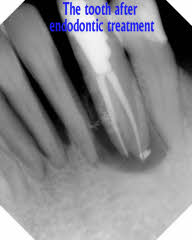Your dentist has recommended that you should be evaluated for possible endodontic treatment. We appreciate his/her concern for the quality of your dental health and his/her consideration in referring you to The Endodontic Practice. The dental surgery is devoted to the conservation of teeth through endodontic treatment. This leaflet is designed to provide answers to questions that are often asked before and sometimes after treatment. We hope that you find it beneficial and informative.
WHAT IS ENDODONTIC TREATMENT?
Endodontic treatment is sometimes called root canal therapy, root treatment or root filling; the terms are synonymous. Endodontic treatment removes damaged or infected tissue from the inside of the tooth. The tissue, called the pulp, contains nerves and blood vessels that help nourish the tooth. After the pulp is removed, the pulp chamber and root canals are cleaned, disinfected, filled and sealed.
WHAT ARE THE BENEFITS OF ENDODONTIC TREATMENT?
Endodontic treatment saves teeth that would otherwise need to be extracted. Although the pulp is removed, the treated tooth remains alive, nourished by the surrounding tissues.
There is no real substitute for your own tooth in terms of health and investment.
WHAT CAUSED THE PROBLEM WITH MY TOOTH?
The most common cause of pulp damage is decay or a fracture that exposes the pulp to bacteria that may cause infection. Other causes of pulp damage include traumatic injuries, such as a blow to the tooth, a cracked or loose filling or repeated fillings in a tooth and occasionally gum disease.
HOW MANY TREATMENTS ARE NECESSARY?
Sometimes endodontic therapy is completed in one visit, but often two or three appointments may be needed.
HOW LONG WILL THE TOOTH LAST?
With proper restoration and care it may last a lifetime.
DOES ENDODONTIC TREATMENT HURT?
With the use of modern techniques, root canal treatment typically involves little or no discomfort. Often there is pain before the treatment and endodontic therapy provides relief.
WILL THERE BE PAIN AFTER THE PROCEDURE?
Cleaning the root canal system may cause some inflammation of the surrounding tissues, but the popular brands of painkillers should alleviate the discomfort. The mild symptoms can last for up to a week after the root filling has been carried out and are not unusual. If postoperative pain persists or increases in severity, please call the surgery.
HOW MUCH DOES ROOT CANAL TREATMENT COST?
The expense of an endodontic procedure varies depending on how severe the problem is and the type of tooth. Molars with two or three canals are more difficult to treat and the fee is accordingly more. Endodontic treatment is usually more economic in the long term than alternative treatments, such as extraction and restoration of the missing tooth with bridges or implants.
WHAT ARE THE ALTERNATIVES TO ENDODONTIC TREATMENT?
Extraction is the only alternative; unless the tooth is replaced, adjoining teeth will shift, interfering with biting and chewing. Loss of a tooth can lead to periodontal disease and loss of additional teeth. Replacing a tooth with an artificial one often requires dental procedures on adjacent healthy teeth.
CAN ALL TEETH BE TREATED ENDODONTICALLY?
Occasionally a tooth cannot be saved. Endodontic treatment can only be performed if the root canals are accessible and can be adequately cleaned and filled. A tooth must also have sufficient bone support.
CAN THE TREATMENT FAIL?
A tooth that has undergone endodontic therapy can occasionally fail. Root canal treatment is performed because the soft inner tissue of the tooth, called the pulp, has been damaged. As with any other part of the body, treatments can be unsuccessful; sometimes for no known reasons, the hard and soft tissues surrounding the tooth may simply fail to heal.
WILL I NEED TO RETURN FOR ANY ADDITIONAL TREATMENT?
Your tooth should be examined six months to a year after treatment to make sure that it has healed properly.
WANT TO KNOW MORE?
If you have any further questions or are worried about treatment, please telephone the practice and Mike or one of the staff will be happy to talk with you. If you have an emergency, please feel free to call.
WHAT DO I DO AFTER ROOT CANAL TREATMENT IS COMPLETED?
Once treatment is completed, you will need to return to your dentist for the final restoration of the tooth. Your own dentist will provide the check-ups and future care for your dental health.
A MESSAGE FROM YOUR ENDODONTIST
This information has been provided from The Endodontic Practice to help your referral treatment go as smoothly as possible.


